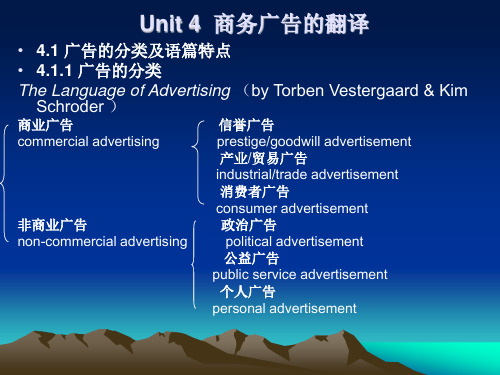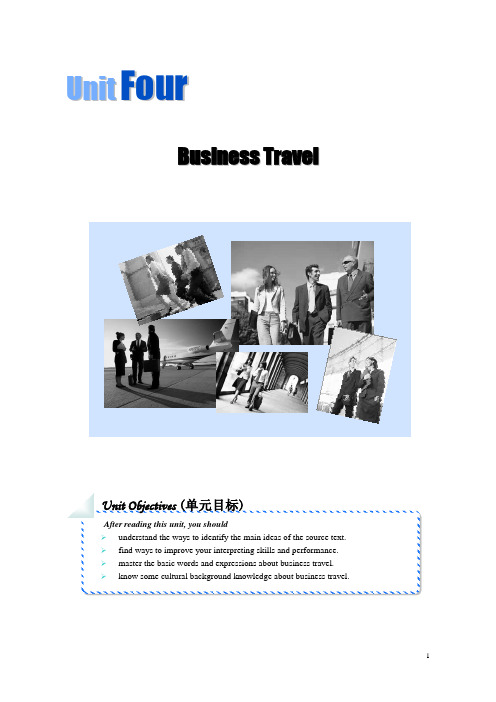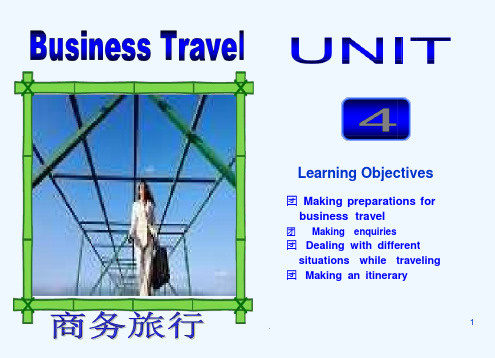商务现场口译UNIT4 PPT
商务英语口译第4章ppt课件

建议:句中的专业术语比较多,这些都是商业谈判中的常 用语,所以需要记忆。
精选课件
15
E-C Interpretation
You can draw on me just as if there were a letter of credit.
建议:注意按照国际惯例,货物装运后卖方须将 装运情况及时通知买方。
精选课件
9
Note-taking (1)
import from other exporters: 从其他出口商进口; an advance payment: 一笔预付款; the interest rate: 利率; make concessions: 做出让步; retract the order: 撤回订单;
certificate of weight; 开始招标的时间:the time of your invitation for bid; 出具保证书:hand in a letter of guarantee;
建议:英语多被动,汉语多主动。如The goods will be inspected by the China Commodity Inspection Bureau. 译为“货物由中国商品检验局进行检验” ,而不是译为“被检验”。
精选课件
3
Vocabulary Work
terms of payment: 支付条款;
specimen contract: 合同样本;
draft sight: 见票即付;
pay a margin: 支付保证金;
D/P (document against payment): 付款交单 是跟单托 收方式下的一种交付单据的办法,指出口方的交 单是以进口方的付款为条件,即进口方付款后才 能向代收银行领取单据;
商务英语4PPT课件

Letter of Credit
❖ Revocable/ Irrevocable ❖ Documentary/ Clean ❖ Confirmed/ Unconfirmed ❖ Sight/ Usance, or Time ❖ Transferable/ Non-transferable ❖ Revolving ❖ Reciprocal ❖ Back to Back ❖ Anticipatory (→Red Clause L/ C) ❖ Standby
Unit 4 Terms of Payment
.
Learning Objective
❖ To make clear terms of payment; ❖ To know the difference between the
three basic terms of payment.
.
Background Information
❖ 3) RMB¥898 in total. ❖ 4) The results of the investigation of the
financial standing of the Malaysian Trading Company.
.
感谢亲观看此幻灯片,此课件部分内容来源于网络, 如有侵权请及时联系我们删除,谢谢配合!
D/ P
D/ A
D/P at Sight
D/P after Sight (D/P. T/R)
.
L arrangement with a bank by which the bank will accept and pay bills of exchange for the customer.
.
人民大2023实用现代商务英语翻译(第二版)PPTUnit 4

例29:Sea, sun, sand,n have all this when you visit the new
Hotel Caliente. 译文:大海、太阳、沙滩、幽静——西班牙!
产业/贸易广告
industrial/trade advertisement
消费者广告
consumer advertisement
非商业广告
政治广告
non-commercial advertising
political advertisement
公益广告
public service advertisement
Unit 4 商务广告的翻译
• 4.1 广告的分类及语篇特点
• 4.1.1 广告的分类
The Language of Advertising (by Torben Vestergaard & Kim Schroder )
商业广告
信誉广告
commercial advertising
prestige/goodwill advertisement
例 7:Pity the pickpocket. 译文:可怜那第三只手。 (某外衣广告)
此则外衣广告的目的是突出衣服口袋的安全性,让小 偷无从下手。广告中使用pickpocket 这个口语体词汇, 相当于汉语中的“第三只手” ,而没用 thief(小偷,贼) 这种比较正式的词,效果更加生动有趣。
例 8:Keep the frog out of your throat. 译文:清咽利喉。 (某咽喉片广告)
1. 比喻。比喻又分明喻和暗喻,使用比喻可以引起消 费者对商品某些特点的联想。例如:
商务现场口译第四单元 Unit 4 Business Travel

U n i t F o u rB u s i n e s s T r a v e lUnit Objectives (单元目标)After reading this unit, you should➢understand the ways to identify the main ideas of the source text.➢find ways to improve your interpreting skills and performance.➢master the basic words and expressions about business travel.➢know some cultural background knowledge about business travel.PreparingI. Interpreting Skills (口译技能)Read the following presentation about discourse analysis and try tounderstand the four speech types and know how to identify the mainideas of the source text. Then complete the following task:1. Listen to the passage, “ My first day in New York”, and answer the followingquestions:1). When did the author first arrive in the US?2). What did the author do on the way to his hotel?3). Where did the author get something to eat after his friend had left?4). Why couldn’t he have what he really wanted at the restaurant?5). What did the author do after dinner?2. Listen to the passage again and try to catch more details, then retell thestory in your own words.Decoding Training (II): Discourse Analysis(语篇分析)Interpreting is to “understand and make understood”. To interpret the speech, one must first understand the message of the speech. However, comprehension(理解)of the source discourse goes beyond the simple recognition of words and linguistic structures. The interpreter shall make an analysis of the source discourse. More importantly, the interpreter shall identify(识别)the speech type and know how to identify the main ideas of the original speeches.Identification of the Speech TypesSpeeches are diversified serving different occasions and purposes. It will be of great help to the interpreters if they know the speaker’s style. In most cases, speeches are prepared beforehand. Therefore, a study of the different types of writing helps an interpreter identify the main idea of a given speech. Following are the basic types of writing.1. Descriptive WritingDescriptive(描述性的)writing involves a great deal of detailed information. A descriptive discussion aimed at providing details of an event, a scene, a procedure, or a situation.This speech type demands a thorough background investigation of the speaker and the relevant situation by the interpreter.2. Narrative WritingNarrative(叙述性的)writing focuses on the development of events. There is no doubt that the interpreter should be very sensitive to dates, time phrases, and verb tenses when a narrative speech is dealt with.3. Expositive WritingExpositive(说明性的)writing deals with its subject matter in such orders as chronological, spatial, comparison, and definition. It would be to the advantage of the interpreter to conduct a background investigation of the speaker and the situation, for that would provide the interpreter with not only thenecessary glossary but also the speaker’s standpoint(立场).4. Persuasive WritingPersuasive(劝说性的)writers always want to make their arguments clear, strong and convincing. When the purpose is to convince, writers of persuasive writing mainly employ two techniques -- induction(归纳)and deduction(推论). Inductive writing starts with specific examples or points to draw a general conclusion, while deductive writing illustrates its thesis at first and then supports and reinforces the thesis through specific examples or subordinate ideas.Identification of the Main IdeasIn the context of interpreting, the main ideas of the source speech can be identified at the sentence level and at the discourse level. Priority should always be attached to identifying the main idea at the sentence level. We argue that identification of main ideas be done on the basis of sentences. Training in identifying the main ideas in interpreting should naturally take place first at the sentence level.1. Sentence LevelThe most important task for an interpreter to identify the main ideas at the sentence level is to discern (洞悉)the subject, verb and object (SVO). It is highly significant for the interpreter to catch the SVO of the sentence while listening to the source text, as the SVO usually carries the major information of the sentence. For example, when listening to “The best way to carry money while traveling is to have a major credit card”, the interpreter is expected to catch “The best way is to have a credit card.” If the interpreter is able to catch the SVO of the sentence, he then will produce a complete sentence with the major information in the target language.2. Discourse LevelThere are also some skills an interpreter might employ on different occasions for grasping the gist (要点)of a speech at the discourse level. In a well-organized speech, the speaker usually explains his point in the first few sentences. Therefore, one of the ways to get the main idea of a speech is to attach priority to the beginning of the speech. Secondly, if the interpreter encounters a speech that is inductively constructed, the interpreter should, to the best of their ability, conduct a study of the speaker's background and viewpoints so that they can follow the speaker's logical guidelines.II. Phrase Interpreting (短语口译)Work on the following words and phrases. Interpret them into Chineseand English respectively.A. English to Chinese1. Have a population of…2. Cover an area of…3. Date back to…4. Have a history of…5. Be situated in…6. The gross domestic product7. Dive-in restaurant 8. Quarantine certificate9. Duration of stay 10. Residence permitB. Chinese to English1、日程安排2、旅行路线3、起飞时间4、机场大楼5、候机室6、贵宾室7、问讯处8、安全检查9、免税店10、个人物品III. Sentence Interpreting (句子口译)Work on the following sentences. Interpret them into Chinese andEnglish respectively.A. English to Chinese1. I believe you're going out of your way for us.2. Wouldn't you like to spend an extra day or two here?3. I'm afraid that won't be possible, much as we'd like to.4. I wonder if it is possible to arrange shopping for us.5. I will keep you posted.B. Chinese to English1. 我特地为你们安排,使你们在北京的逗留愉快。
商务英语课程ppt课件Unit4BusinessTravel

the other key ) . Just in case your luggage is misplaced or lost, I advise you to include
basic toiletries ( make- up, tooth paste & brush etc . ) , bathing suit,
learn!
Predetermine which seminars you would like to attend. Check their schedules and be there on time.
Business cards, brochures and samples of your products and services are all very important. Make sure you have enough of your marketing tools with you or ship materials well in advance of event. Just to make sure all has safely arrived, I suggest that you confirm the delivery of your products before you leave home.
Before a business travel, necessary precautions should be taken to minimize potential problems. Usually a travel agency is needed for booking /reserving flights and accommodations according to the itinerary. The traveler is supposed not only to deal with all kinds of unexpected situations during the travel, but also to meet business associates, to organize some conferences, and to do business in other cultures, so as to make the visit successful.
商务英语Unit 4PPT课件

recommendations if requested
21.05.2020
.
10
4.2 Using notes to write a report
❖ Tips for Creating Good Business Reports 1. Try to make your report attractive, clear,
Business letter writing
21.05.2020
.பைடு நூலகம்
7
4.2 Using notes to write a report
Objectives: 1. Practise transforming notes into a
connected text. 2. Learn to link up ideas and add
Summaries, notes, reports 4
21.05.2020
.
1
Objectives
1. Learn how to take notes in business contexts
2. Learn how to summarize a conversation
3. Learn how to plan and write reports 4. Practise note-writing, summary-
21.05.2020
.
6
4.1 Summarizing a conversation
Part C ❖ Practise drafting a summary of your
- 1、下载文档前请自行甄别文档内容的完整性,平台不提供额外的编辑、内容补充、找答案等附加服务。
- 2、"仅部分预览"的文档,不可在线预览部分如存在完整性等问题,可反馈申请退款(可完整预览的文档不适用该条件!)。
- 3、如文档侵犯您的权益,请联系客服反馈,我们会尽快为您处理(人工客服工作时间:9:00-18:30)。
Teacher’s Comments
The candidate has met the standard, knowledge and skill requirements.
Candidates: ___________________ Assessor: ____________________
Date ___________________ Date ___________________
Assignment --Simulation Exercises
Work in groups. Role-play the following situations with your partners, acting as the Chinese speaker, English speaker and the interpreter
我们全体都很高兴来此参加这次电脑科技研讨会,我们都阅读过有 关中国电脑非凡成就的报道,我们也都看到足以证明这一工业 在中国健全发展的各项数据,现在我们有了做更仔细观察的机 会,我知道我们可以从你们的经验中学到很多,也希望我们的 经验对你们能有所裨益。
……
Performing --Coordinating (Field Interpreting)
1. seminar 2. go on a business trip 3. a corporate card 4. application form 5. maximum 6. personal items 7. receipts 8. a frequent flyer card
1. 研讨会 2. 出差 3. 公司信用卡 4. 申请表 5. 最高限额 6. 私人用品 7. 收据 8. 飞行积分卡
Listen to the passage, “ My first day in New York”, and answer the following questions:
When did the author first arrive in the US? What did the author do on the way to his
1. schedule 2. itinerary 3. departure time 4. terminal building 5. departure lounge 6. VIP Room 7. information desk 8. security check 9. duty-free shop 10. personal effects
Performing --Decoding (Note-taking)
Performing --Memorizing (Story-retelling)
Listen to the recordings of Text A again. Try to catch more details and improve your notes. Then retell the speech in your own words with the help of your notes.
Preparing --Sentences Interpreting
A. English to Chinese
1. 我相信这是对我们的特殊照顾了。 2. 你们不愿意在这儿多待一两天吗? 3. 尽管我们很想这样做,但恐怕不行了。 4. 我想能否在我们访问结束时为我们安排一点时间
购物。 5. 我会与你保持联络。
3. So our evenings will be quite full then? 4. We've arranged our schedule without any trouble. 5. Here is a copy of the itinerary we have worked
out for you and your friends. Would you please have a look at it?
1. 有……人口 2. 有……面积 3. 追溯到…… 4. 有……年的历史 5. 位于…… 6. 国内生产总值 7. 免下车餐厅 8. 卫生证明 9. 居留期限 10. 居住证
Preparing --Phrases Interpreting
B. Chinese to English
1. 日程安排 2. 旅行路线 3. 起飞时间 4. 机场大楼 5. 候机室 6. 贵宾室 7. 问讯处 8. 安全检查 9. 免税店 10. 个人物品
hotel? Where did the author get something to eat
after his friend had left? Why couldn’t he have what he really wanted
at the restaurant? What did the author do after dinner?
Preparing --Skills Presentation
Decoding Training (II): Discourse Analysis
Identification of the Speech Types
1. Descriptive Writing 2. Narrative Writing 3. Expositive Writing 4. Persuasive Writing
Points to Remember
An analysis of speech types is a determinant factor in interpreting.
There are four basic speech types: descriptive, persuasive, expository, and narrative.
environment 6. Window of the World 7. Splendid China
Packaging --Interpreting and Assessment
Packaging -- Feedback and Comments
Aims of this Unit
Student’s Feedback
respectively. One group will be invited to perform in class.
Situation A Mr. King, the sales representative of Universe Toy Company in London has a business meeting in China, the secretary in Chinese company discuss the itinerary with him. Try to do interpreting work. 29 March 0900Meeting with Executive Manager 1500Factory visit 30 March 1000Going to Trade Fair 31 March 1000Conference with Chinese company 1400Shopping 1 April Conference with Chinese company 2 April Sight seeing in city
B. Chinese to English
1. I've come to make sure that your stay in Beijing is a pleasant one.
2. It's just the matter of the schedule, that is, if it is convenient for you right now.
Business Travel
Unit Four
Unit Objectives
After studying this unit, you should understand the ways to identify the main ideas
of the source text. find ways to improve your interpreting skills
The main ideas of the source speech can be identified at the sentence level and at the discourse level.
The most important task for an interpreter is to discern from the clusters of utterances the subject, verb and object.
Performing --Encoding (Message Reconstructing)
女士们,先生们:
……
从我抵此的短暂时间所见的点滴来看。我必须说中国是个很美的国 家,人民也非常友善。我知道我可以代表每一个人来说这话, 因为从到达机场那一刻开始,就有许多能干且考虑周到的人来 处理我们的各种琐碎事情,使得整个紧张的旅程变得轻松愉快, 你们提供的食宿非常舒适,研讨会场的布置也轻松合适,但又 井然有序。
Identification of the Main Ideas
1. Sentence Level 2. Discourse Level
Preparing --Phrases Interpreting
A. English to Chinese
1. Have a population of… 2. Cover an area of… 3. Date back to… 4. Have a history of… 5. Be situated in… 6. The gross domestic product 7. Drive-in restaurant 8. Quarantine certificate 9. Duration of stay 10. Residence permit
